Archives
Love your Plumber on World Plumbing Day 2024
G’day, it’s The Lone Drainer and Pronto here to tell you why World Plumbing Day, Monday March 11th 2024, is worth celebrating!
Take a quick look behind the scenes at our Coogee plumbing HeadQuarters to see how we celebrate every day.
It can be a lot of fun showing up for our clients daily.
We prepare ourselves and our equipment and load up materials before coming out to see you at your home or business.
But, you won’t see us giving Plunger a rubdown, sweeping the floors, making everything spic and span.
Checking on all our high-pressure drain cleaning equipment to see it’s in tip-top condition to easily fix your blocked drains.
We’ve got drain cleaning equipment for every situation.
You won’t see us reviewing footage from the inside of your sewerage pipes to find out precisely what’s going on, or working on some entertaining and educational blog posts just like this, our specialty.
We bring a variety of parts to fix your taps and toilets, and what we don’t have, we’ll get pretty quickly. You won’t see us stacking mountains of toilet paper, just in case you need it.
We bring loads of equipment to the job, just for you, and when we show up at your place, you won’t know we’ve come from our plumbing HQ here in Melody Street, Coogee.
P.S. Take another minute and watch a few scenes from The Cutting Room
But seriously, plumbing is an often forgotten, but critical component of our modern society that many people take for granted. Plumbing allows us to access clean water, safely dispose of waste water, and maintain hygiene and sanitation in our homes, workplaces, and public spaces. Without plumbing, our daily lives would be much more difficult and unhygienic.
Secondly, World Plumbing Day provides an opportunity to raise awareness about the importance of plumbing and the role that plumbers play in maintaining public health and safety. It’s a chance to recognize the hard work and dedication of plumbers, who often work in challenging conditions to ensure that your plumbing systems are working properly.
Finally, World Plumbing Day is an occasion to promote sustainable plumbing practices and technologies that can help conserve water, reduce energy usage, and minimize environmental impact. As plumbers, we have a responsibility to ensure that our work is not only effective but also sustainable and environmentally friendly.
So, let’s raise a toast on World Plumbing Day and all the great plumbers out there who keep your plumbing systems running smoothly and our communities healthy and safe!
And, as we say in Australia, “‘ave a good one”!
Save water with a half flush toilet?
In April 2023 most toilets are designed to use less water, so they have a dual flush toilet cistern, which allows the user to choose between a full flush and a half flush.
Using the appropriate flush will help save water.
As we move into Winter, traditionally our dry season, rainfall is less and, water saving is still a thing.
With that in mind, we should use the half flush for liquid waste and the full flush for solid waste.
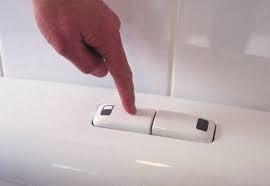
The full flush is typically used more often than the half flush, as it is designed to clear all waste from the toilet bowl.
Remember not to use the toilet as a rubbish bin. Flushing non-biodegradable items can cause blocked pipes and drains, and cause damage to the plumbing.
If your toilet flush isn’t working as it should it is wasting water and adding to your water bill.
A running toilet cistern sounds like a job for The Lone Drainer and Pronto.
Call us on 02 9664 4990
Click here to see the current water levels in the Greater Sydney Catchment area.
The Joy of Toilets in Coogee
Exactly 12 months ago today the Mayor of Randwick Noel D’Souza, broke ground on the new Coogee Beach toilet block. I am happy to report that these new facilities were un-officially opened 360 days later on Friday September 1st 2017. The first day of spring.
And it was worth the wait!
The discomfort to beach regulars and the interruption of the foot traffic flow along the upper and lower promenade right in the middle of Coogee beach is a distant memory.
I’ve been watching the evolution of the site and my almost daily hop, skip and jump along the lower prom and the detour around the street level construction zone sensed that this simple toilet block would be another jewel in the Coogee crown. I was right!
The spring weather on Fathers Day saw people out in droves. They were happy to use the new facilities. I had to try ’em for myself. The plumbing is state of the art.
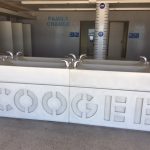 The hand wash facilities at the front of the change room with electronic sensor taps that spit water into the free form basins when they detect your hands in range, compliment the soap dispensers. The showers in this open public area are all push button. I tried one and had my shirt sleeve soaked by the instant arrival of fresh H2O from the water saving shower head.
The hand wash facilities at the front of the change room with electronic sensor taps that spit water into the free form basins when they detect your hands in range, compliment the soap dispensers. The showers in this open public area are all push button. I tried one and had my shirt sleeve soaked by the instant arrival of fresh H2O from the water saving shower head.
Mums and Dads will be able to rinse off and have their kids do the same without having to go into the change rooms and toilets dedicated to both sexes.
I didn’t venture into the ladies but the men’s change room is great.
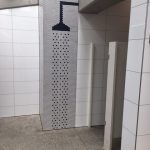 Features include 5 low maintenance stainless steel WCs with concealed water saving cisterns and an easy to maintain urinal about 5 metres long, 5 additional showers and plenty of clothes hooks and seating to get changed before and after swimming. The entire area can be easily washed down and the beautiful polished concrete floor and the brightly tiled walls will help keep the facility sparkling.
Features include 5 low maintenance stainless steel WCs with concealed water saving cisterns and an easy to maintain urinal about 5 metres long, 5 additional showers and plenty of clothes hooks and seating to get changed before and after swimming. The entire area can be easily washed down and the beautiful polished concrete floor and the brightly tiled walls will help keep the facility sparkling.
During my roaming through the freshly laid turf in the park above, I had wondered about the new concrete seating and the glass panels set into the ground there.

I’m pleased to say they are skylights for the change rooms below. Brilliant!
Well done Randwick City Council.
Toilet Hygiene #1
Q. What’s the 3rd most un-hygienic place in the bathroom?
A. The toilet flush button.
Who’d have thought? Now, wash your hands!

8 Reasons to drink water!

It’s easy to take water for granted.
I spend most of my life working with water, delivering it to your taps and toilets and working on blocked drains that won’t allow your waste water to run away.
My entire family’s leisure time is spent scuba diving and snorkeling, surfing and sailing, swimming and socialising on and in the water. And when we’ve finished having fun in the water, we all shower off! Water is a major part of our life.
But drinking water is something I must make part of my life as middle age sneaks up on me. I know to be with the ones I love and do the things I love, I must have good health. And, I usually say if I can do it, then it’s pretty easy to do!
So here’s my top 8 good reasons why we should drink more water:
Lose weight: Drinking water helps you lose weight because it flushes out the by-products of fat breakdown. Drinking water reduces hunger, it’s an effective appetite suppressant so you’ll eat less. Plus, water has zero calories.
A Natural Remedy for Headache: Helps relieve headache and back pain usually caused by dehydration. Although many reasons contribute to headache, dehydration is the common one. This is a big one for me.
Better Productivity at Work: Your brain is mostly made up of water, so drinking water helps you think better and be more alert, cause we need more alerts!
Better Exercise: Drinking water regulates your body temperature, so you should feel more energetic when doing exercises. Water helps fuel your muscles; and I need that.
Helps with Digestion and Constipation: Drinking water raises your metabolism because it helps with digestion. Fibre and water should go hand in hand so that you can have your daily bowel movement. Water is good for the personal plumbing as well as the house plumbing.
Reduce Sickness: Drinking plenty of water helps fight against flu and things like kidney stones and heart attack. I fill the water jug and roughly cut 2 or 3 lemons, add them in and leave it to sit for a while. It apparently helps intestinal problems. Plus it can improve your immune system.
Improve your Mood: Your body feels very good and that’s why you feel happy. Helps with Furking (Having fun…….. while you’re working).
Reduce the Risk of Cancer: Some studies of the digestive system show that drinking a healthy amount of water may reduce the risks of bladder cancer and colon cancer. Water dilutes the concentration of cancer-causing agents in the urine and shortens the time in which they are in contact with your bladder lining. Now, that sounds good to me!
Water Saving Tips for your Garden

Did you know about 35% of household water usage occurs in the garden?
In my daily rounds the common theme is how the spring has unfolded, the gardens are in bloom, the Jasmine flowers have come and gone. We’ve had very little rain lately on the coast but, after recent temperatures reaching 36 degrees, our gardens are dry.
It helps if you know the needs of your plants. More plants die from over watering than lack of water so don’t drown ’em.
So here are a few water saving Do’s and Dont’s:
– Do choose water efficient plants and grasses.
– Do mulch your garden.
– Do install a drip feed system to water the gardens and lawns. It’s pretty easy to do. If you need a hand just ask us.
– Don’t water in the heat of the day. Heat = Evaporation and the watering process can burn your lawn and plants. Water early or late. Cool is good!
– Don’t assume the garden needs watering. Check the soil to see whether its dry before turning on that hose.
– Don’t water for long periods if your garden slopes. The water just runs off. Allow it to soak in!
– Don’t water on windy days especially with sprinklers and fine sprays. Wind increases evaporation.
– Don’t water everyday, if its practical give em a drink twice a week to encourage the roots to grow deeper
– Don’t water for 1-2 weeks after a good soaking rain.
– Don’t forget to drink yourself. Personal hydration is even more important!
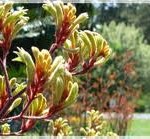
Just Add Water
Everyone is talking about the upcoming summer like its the imminent return of an old old friend. My sunrise learn-to-surf visits to the local beaches find them full of boys and girls and boot campers getting buffed for the summer unveiling of the new bod. And everyone is drinking water out of water bottles.
Now, hydration is not a new theme and the sweat produced to work that body needs to be topped up with good old H2O, Adams ale, water, the universal solvent. Its well known that people who engage in strenuous physical exertion or live in a hot climate (that’s us people) need to drink plenty of water.
After swallowing more than my share of the Tasman Sea most mornings, I guzzle water from the beach taps to re-hydrate myself.
The human body is anywhere from 55% to 78% water depending on your body size. A simple rule of thumb, 2/3 of our body consists of water.
Did you know that your tissues and organs are mainly made up of water?
• Muscle consists of 75% water, Blood consists of 83% water, Bone consists of 22% of water, Brain consists of 90% of water.
• The recommended amount is 8-10 glasses of aqua per day.
• So remember, if your gonna work it, you have to re-hydrate it.
• Dr Dave says, Drink more water!
Water saving tips for Spring
Now we are really into spring and the gardens are blooming, after our long weekend heatwave, the lawn needs to be watered.
A dripping tap can waste up to anywhere between 30 and 200 litres of water a day. That’s over 70,000 litres a year.
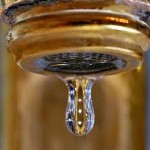
So here are a couple of simple water saving tips to get you through spring and the long hot summer ahead.
Ensure all household and garden taps are always turned off tightly so they don’t drip. Don’t force taps as you can damage them and actually cause leaks.
Develop a regular routine of checking all indoor and outdoor taps, washers and pipes for leaks, cracks and breaks.
Check all your household appliances for water leaks. Learn how to repair leaking taps; a new washer is inexpensive and easily available at your local hardware store.
If in doubt call us for some over the phone guidance on 02 9664 4990.
Help! Where does my Hot Water turn off?
“HELP!“
“My water heater is spitting out hot water and steam. Can you get over here Urgently?” “I don’t know how to turn it off and I think it’s going to explode!”
Monday morning brought a call from Deborah in Randwick. It sounds like a job for The Lone Drainer ……and Pronto.
Of course we were able to rescue Deborah. We replaced the water heater and the gas and water shut-off valves that controlled the unit. But, how many people don’t know how to turn off their water heater?
The image below shows where to shut off the water and gas supply to the heater. Why don’t you practice turning the water heater off when it isn’t urgent?
If you need help Call us 02 9664 4990
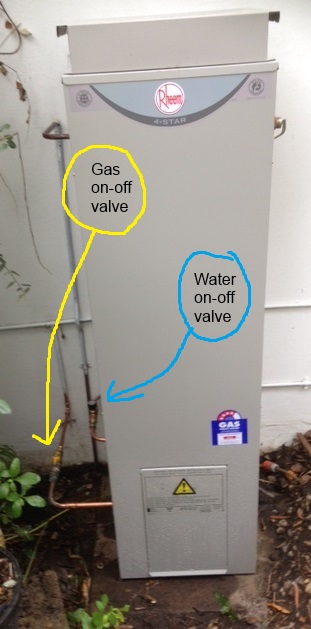
Stop Leaking Taps
As a plumber, the majority of house calls I make have to do with leaking taps. Obviously in most cases it is correct to call a plumber but some times we are called to houses to carry out a simple plumbing job that takes five minutes which could have easily been completed by anyone with a little know-how.
Here are a few pointers that can help to avoid problems like these:
- Treat taps gently. They should be turned off with thumb & forefinger. If you are having an arm wrestle turning your taps off, stop it!
- Try to repair a dripping tap if you can. Always turn the water supply to the house off first!
- Simple repairs can be done by anyone. Don’t forget the o-rings, tap washers, tap seats and fibre washers. Lubricate them all.
- There are so many types of taps available today, even the pros need to seek advice.
- There is no shame in not being able to repair a dripping tap. I have seen plumbers who are grown men cry over leaks like these.
Flush with Facts #2
August is the month of the good toilet flush!
Did you know the dual flush toilet cistern was a 1980 Australian invention by Bruce Thompson, an employee of Caroma?
The dual flush toilet cistern saves 32,000 litres of water per household per year. In 2014 most modern toilet cisterns have an internal overflow tube, so if your float valve doesn’t shut off, the water runs straight into your loo, rather than overflowing onto the floor….. So the single flush toilet cistern should be a thing of the past!
Stormwater drain blockages
Send it down Huey! As Sydney gets through another day of torrential rain and some eastern parts of this country are getting their best rainfall for more than a year, its important to keep your stormwater gutters, downpipes, grates and drains clear.
My own roof gutters were overflowing yesterday ’cause the leaves from our deciduous tree were blocking our down pipes.
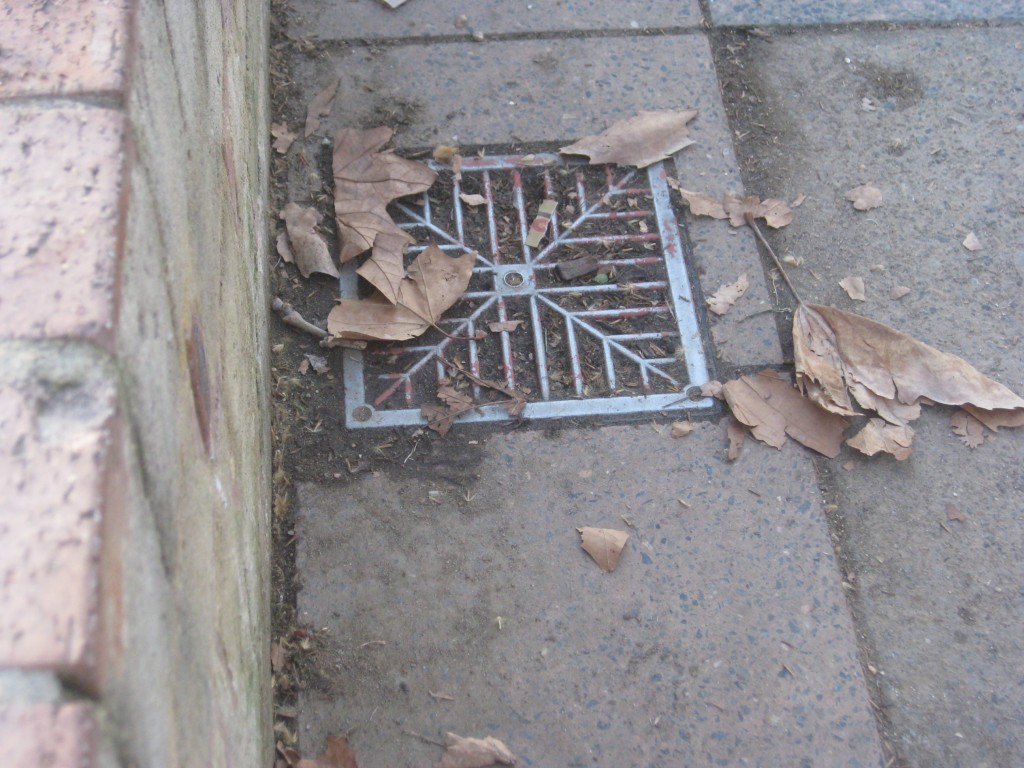
3 Tips for Healthy Hot Water
Who had a cold shower this morning?
Winter makes the need for hot water a high priority. If you think your heater is under performing do this quick water heater health check.
1. Check the colour of your water. If its brown, your water heater has a buildup of sediment or rust.
2. Check your Temperature and Pressure Relief valve (like the one shown below), pull the lever; it should spurt out water till you let go of the lever. If it dribbles afterwards, it needs attention.
3. Does the stop valve work? Try turning it off, test the water at your hot taps and turn it back on. Ideally it should stop the water flow through the heater.
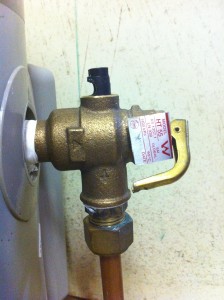
Whether your water heater is gas or electric, storage or continuous, check it regularly.
If your hot water runs out get your friendly plumber to check it over
Using a public toilet. Should I hover or cover the seat?
Here is a little fun on Friday! Have a great weekend, and wash your hands!
Common pipelines; easements, ownership and liability #2

One recurring topic of 2010 is the Ownership and liability of common water, sewer and gas pipes.
When we send out an emergency response team to a ruptured gas or water pipeline or an overflowing sewer, the first thing our team thinks about is rescuing the property under threat. Often, it is after the emergency that ownership and liability of the problem are hotly debated.
This series of 3 blog posts is aimed at clarifying some of that debate.
Our friends at the Law Reform Commission have helped to clarify this interesting subject and in part it reads:
A user of a service may attempt to disconnect the joint service and force other users of the service to bear the cost of a direct connection to the main service. Such action will however, be illegal unless conducted in accordance with the Water Board Act 1987 (Water Board (Plumbing and Drainage ) Regulation 1989),2 or a court order declaring that the common user of the service has a right to discontinue the service.
The creation of permanent rights of access is seen as a means of avoiding problems of access in respect of utility services, and applications have been made to the courts over the years to have access to and over utilities such as water pipes and sewers recognised as easements of necessity. The courts have, however, gone to considerable lengths to hold that although such an easement may be considered by a landowner to be essential for the reasonable enjoyment of property, it is not an easement of necessity, because at law, easements over such services are not considered necessary to the land itself.
Although DP 22 raised the possibility of statutory recognition of these “trespassing” services as a means of rectifying the problem, the Board of Surveyors pointed out in their submission that few authorities know with any exactitude the location of their service lines. Consequently, the Board of Surveyors opposes the creation of statutory easements over them until such time as they are properly defined on title. The Commission agrees that such a step may be expensive and premature at this stage. It would seem desirable however, that steps are taken in the long term by the relevant authorities to locate such services, properly record them and establish the appropriate rights over them.
Don’t play Noughts and Crosses when you have sewer problems
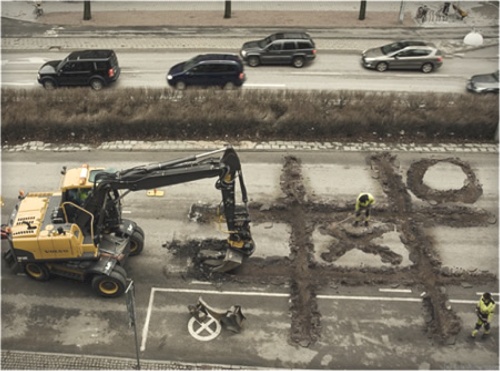
Today’s post comes courtesy of Dr Marc Dussault, The Exponential Growth Strategist. At his recent Exponential Business Building Bootcamp, he showed a series of “impossible pictures” from Swedish Artist Erik Johansson. This photo was of particular interest. This is what we want to avoid with the use of Vaporooter when tree roots get into and block your pipes and drains.
Plumbers love your pets
Your Dog and Dealing with Internal Renovations
Dogs and cats find renovations very stressful: there are strangers in their home changing things, moving things around and disrupting their routine. Some of the risks involved range from escape behaviour, bad dog behaviour, territorial behaviour and the general stress of strangers and loud noises in their space. You also have the risk of injury or the potential of your fur baby being exposed to toxins. Unlike the tradesman, there are no protective masks or clothing for your pet.
Lead and Asbestos, as most of us know, are bad for us, but it’s just as bad for our pets. Years ago it was common for house paint to contain high levels of Lead in addition to Asbestos in our walls. Startlingly before 1970 most paints contained up to 50% lead. Disturbing the paint during renovations can be risky business and you need to ensure you keep yours, and your pet’s, exposure levels down and leave this sort of job to the experts!
Lead and Asbestos will only resurface if it is disturbed; your tradie could unintentionally do this and create a risk. If you’re renovating be sure to follow these simple steps to make sure your family and pets are safe from Lead and Asbestos.
Step 1 – Look into how much asbestos you will have to work around and whether your paint contains lead. The most likely places to find lead paint will be on the kitchen and bathroom cupboards, window frames, skirting boards, doors, architraves, picture rails, exterior walls, gutters, metal surfaces and fascias.
Step 2 – Use the appropriate tools and equipment for the task at hand. Protective clothing is a must! A respirator, disposable coveralls, disposable overshoes, a hat, and gloves will protect you from any dust containing lead. Find somewhere to keep your pets safe while the renovations are happening, a relative, friend or a doggy daycare is always a good idea to get the pets out of the house.
Step 3 – Prepare fully for interior or exterior work. Get experts to deal with Asbestos as there is a multitude of legislation governing the tampering and removal of Asbestos.
Step 4 – Deal appropriately with paint containing Lead. Use techniques that minimise the creation and dispersion of dust or fumes. Large portions of dust or wastewater that contain lead can contaminate the house and garden so it is best not to dry sand or use abrasive blasting. It’s always safer to avoid creating the dust as opposed to cleaning it up after as dust containing only 1% lead can be harmful.
Step 5 – Use a 3 bucket wet cleaning method to eliminate any left over chemicals.
Step 6 – Dispose of contaminated waste appropriately.
This Blog Post was kindly supplied by the Friendly Team at Paddington Pups, Queensland’s Number #1 Doggy Daycare Centre.
Washing machines & dishwasher maintenance
With 3 growing boys living at home who eat like there is no tomorrow, between playing rugby, cricket and doing patrols at Coogee Surf Club, we have plenty of dishes to wash up every day as well as laundry to do every day, so much so, that both appliances broke down at the same time!
Yes it happens to plumbers as well!
So we had our brightest plumbing apprentice just install a new dishwasher and washing machine and it made me aware of the importance of these water appliances and how we should maintain them.
1. Their hoses are rubber, so with hot water they perish and may rupture; so check them regularly.
2. Many people turn these control valves or taps off at the end of every wash. In our house that would be impossible.
3. Turn taps off when going on holidays. Don’t forget to turn them back on when you return.
Just recently, our emergency plumbers rescued a young mother who had been to Adelaide for three weeks. The hose feeding her washing machine ruptured causing many dollars worth of damage:
- Her washing machine shorted out electrically (needs a new machine).
- The laundry/bathroom was covered in mould from the steam (needs repainting).
- Assorted bits and pieces of furniture were damaged.
- The carpets in the hallway were waterlogged.
- The parquet flooring at the end of the hallway had buckled and would need major repairs, then re-sanding and staining.
- Not to mention the aggravation of removing all furniture and of course taking the young children away from the home for several days whilst these procedures were carried out. The fumes from the floor staining were intoxicating.
Antonio Gaudi water conservationist
Barcelona 2010
To visit Park Guell and see the home and creative brilliance of Antonio Gaudi is a special treat.
Gaudi created Park Guell for the citizens of Barcelona. It has gardens and homes with a view of the city and the Plaza.
The Plaza is a meeting place for the people of the city and the brightly coloured mosaic seating around the manmade plaza had a secondary purpose. The dry Mediterranean weather usually meant excess water used on something as soothing as a fountain for the citizens and visitors to the city was a waste of water. That didn’t phase Gaudi.
The water catchment created by the Plaza was a brilliant idea to collect any rainwater that fell, and through an underground filter and the storage system, the rainwater was then piped to the mouth of a Mosaic dragon lying in a garden with a fish and lily pond at the bottom of the beautiful staircase.
The ergonomic design of the seating around the Plaza, which was beautifully decorated in mosaics, was incredibly comfortable to sit back, relax and talk with friends and family.
Gaudi’s design allowed any water from those brief showers to fall to the back of the seating and then get channelled off quickly into a gutter on the outside of the seating and then dispersed to the dry garden areas below through a series of “spitters” hand carved in stone.
Absolutely Beautiful!

Park Guell Lion

Rain lions
Plumbers and dogs
Can Your Dog and the Tradies Play Nice?
Renovations and refurbishing is a hectic and stressful time for anyone involved, but what about the family pooch. Are you having concerns with your dog getting under feet, barking at the strange men in his house or stealing tools?
This is a common problem. Just like us, your dog can get very stressed about having work done in his home. Any behaviour associated with this stress can be a safety risk for not only your dog but also the tradies. As far as your dog is concerned, the tradies are strangers who have come into their home and have started changing things! In addition to this stress there is also the risk of your dog escaping from the yard, as the loud noises of building can also cause significant fear and stress, not to mention the potential for injury, or being exposed to toxins. Unlike the tradesman, there are no protective masks or clothing for your dog.
The best and safest way to deal with this tense situation is to relocate your dog while any work is being done. If it’s a day to day thing then a Doggy Daycare may be just what you need! You can drop off your pooch in the morning before work and easily collect him or her at the end of day, your dog will be exhausted and happy after a day of walks, play and socialisation.
The best way to get your pooch into daycare is to make contact, check their specific requirements and availability. It is the norm for your daycare to ask for a copy of your dog’s current vaccination certificate, your contact details and the details of your vet. Your dog should be desexed (assuming they are old enough) and they should be friendly and socialise well with other dogs, a responsible daycare will also provide stringent supervision on those first few days to make sure everyone is getting along. Then you can rest easy that your dog is playing and having a great time at daycare instead of stressing out and getting underfoot while your tradesmen are working!
This Information was supplied by the Friendly Team at Paddington Pups, Doggy Day Care Centre, Dog Grooming and Dog Supplies Brisbane.
Drainoscopy technology works for a shoe fit!
All plumbers know that apart from looking after our hands, our feet are equally as important. No feet, no action!
I was busy speaking to the smart Real estate property managers of Bondi Beach about the benefits of having a great plumbing team like The Lone Drainer and Pronto, look after their emergency plumbing repairs and the benefits of using Vaporooter for sewer tree root control.
As I walked down Gould street I came across The Running Company Bondi. The owner Chris Chapman had a smile as big as Bondi and it was only minutes before he had me on his treadmill, filming my walking/running gait with some simple, but powerful video tools.
Buying shoes from someone who actually knows about running shoes makes a huge difference. Chris’ advice was so professional and made so much sense. Chris had me on his treadmill in each different shoe I tried on, to check how my feet were landing with his video equipment. Buying running shoes from a shoe expert who is also a runner makes a lot of sense. Since a bad lower leg injury about 14 years ago, I have been suffering with knee and hip pain whenever I run. When Chris showed me the running analysis he uses I realized why.
As with advice on emergency plumbing repairs, if you’re wearing the wrong pair of trainers you could be setting yourself up for all sorts of problems in a few weeks, months or years from now. It seems most sales people at the big chain stores just don’t know this stuff, which is why it’s important to get checked now before you get injured. If you suffer from any sort of knee pain or shin splints when you run, or want to prevent future problems I highly recommend you spare an hour of your time and come along to meet Chris at The Running Company Bondi.
The importance of getting the right advice about plumbing repairs or your trainers is self evident. Oh, I made a decision about my new runners pretty quickly!
The drainoscopy camera survey makes it easier for our clients to also make an accurate decision about their plumbing problems!
Hot Water Heaters are Big ticket items $$$$
Do you know:
- Where is your hot water supply coming from?
- Is it electric or gas? Can you turn off the supply safely?
- The pressure relief valve (T&PR valve), usually near the top of the heater, should be eased quarterly; it does drip water under normal circumstances, but should not constantly be running.
- Turning your water heater off whilst on holidays saves electricity and gas. The unit will heat and cool whilst you’re away, wasting energy & your money. Turn it on when you return, have a coffee, unpack, say hi to neighbours etc. The water will be hot before you know it
- Don’t forget to shut off the water valve. Storage heaters are under pressure. My brother in law had his water heater burst about the time he boarded a jet for the islands. After 2 weeks, the damage to carpet, floorboards, furniture, paint added up – $$$$!
- Flexible water connections on the inlet and outlet of your water heater are dangerous. Check if you have them. If you do, I strongly recommend you have them removed and have the connections redone in copper tube and brass fittings. I guarantee these flexis will rupture and if they are indoors the damage they can cause is huge.
- Rusty water coming from the unit is a sign of age and potential disaster. Don’t ignore it!
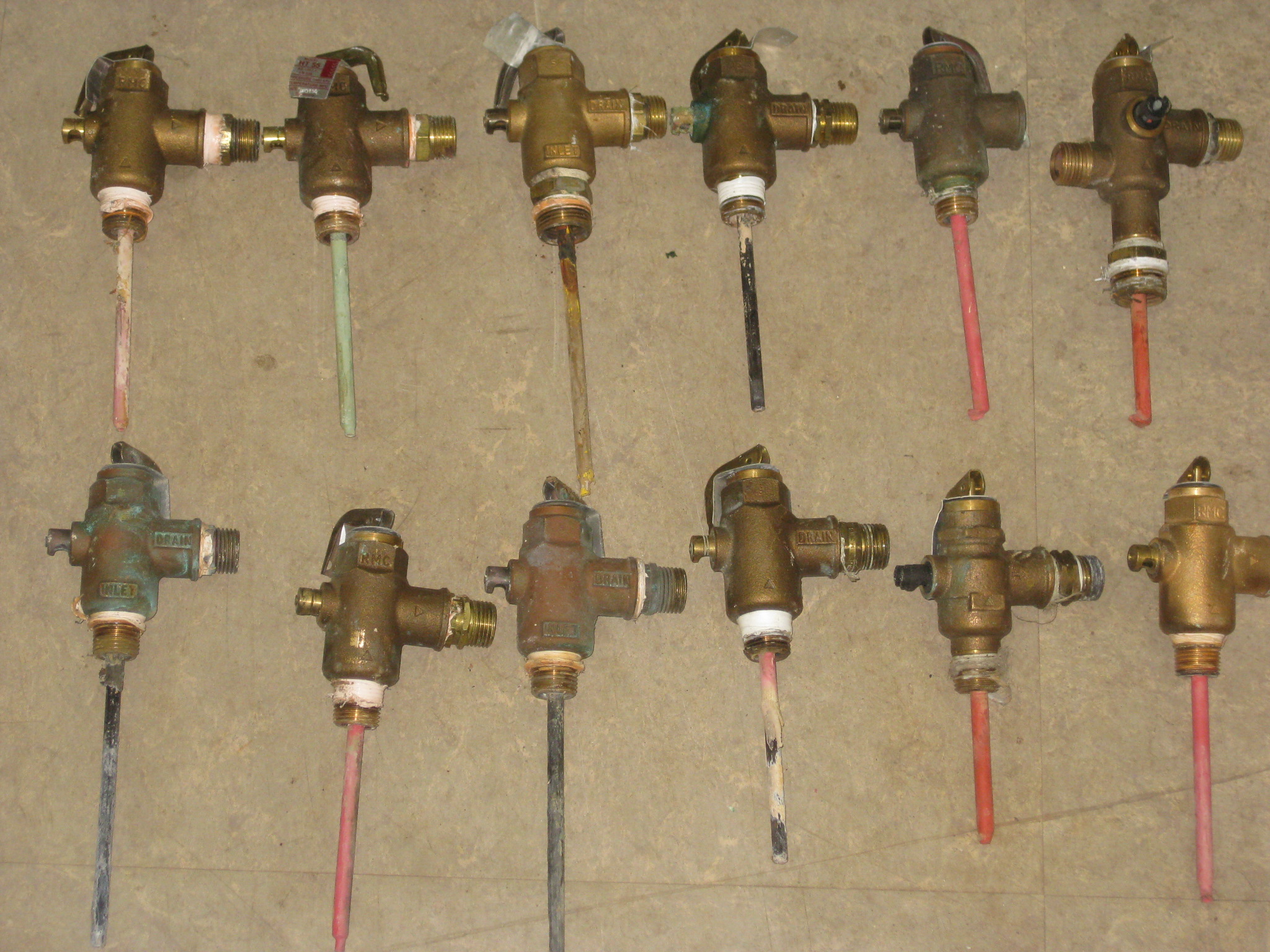
Temperature & Pressure Relief valves. Don’t forget to activate them.
What do you know about your gas supply?
Winter starts tomorrow and if gas is your preferred method of heating then read on…
Natural gas is a great resource to have in any home for ovens, cooktops and hot water heating. However leaks in a high pressure gas line can be extremely dangerous especially if they go unnoticed or are allowed to continue unchecked. The massive explosion in Bondi Junction last year is an example of how horrible a gas blast can be.
If you live in a building with multiple gas meters, it is really important to know where your gas meter is and how to turn it off. Make sure all the gas meters in your building are labelled or numbered clearly, so that in the event of an emergency, you can turn your gas off safely.
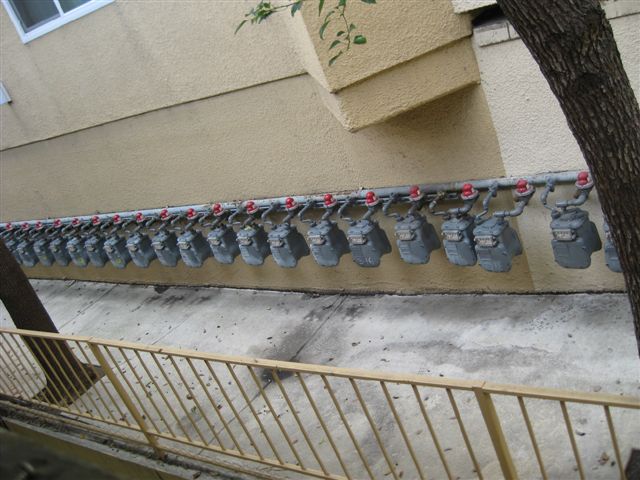
Which gas meter is mine?
Here are some pointers to detect gas leaks early so that appropriate measures can be taken to avoid major damage.
- If you suspect a gas leak, mix some bubbles using detergent with water, and cover the suspect area. If bubbles expand, you have found the leak.
- Don’t ignore a gas leak. Gas can be dangerous! Not to mention your bills will be increased.
- Disconnect your plugged-in gas heater in summer.
- When reconnecting the heater in winter and the bayonet is difficult to plug in, it is probably dusty. Dust and lubricate the connection, then try again.
- Don’t mess around with gas. If you are not sure don’t touch!
If you are not sure when it comes to a gas pipe problem, always call a licenced plumber and gasfitter.
7 easy ways to extend the life of your Water Heater
Have you found yourself in a situation where its winter and you head home for a shower after work, or after a rugby or netball training session, turn on the hot water tap and the water is cold?
There are many plumbing fixtures around your home, the bath or hand basin, kitchen sink, of course the toilet. Some homes, offices and small business have multiple toilets, showers and basins.
As we move into the cooler months the average hot water heater becomes more important for all these plumbing fixtures to work.
Its easy to take these often ignored assets in your home or office for granted, but some simple actions will prolong the life of your storage water heater.
Replacing your hot water heater can usually be unexpected and sometimes expensive, but in today’s fast moving world we can easily ignore this vital cog in our daily routine.
So be sure you are aware of the following:
- Where is your water heater? You need to know where it is!
- Is it gas or electric? You need to know!
- Can you turn off the gas or electricity?
- Can you turn off the water supply to your heater? Try it! Check this valve or tap works
- Is it a mains pressure storage heater or instant (continuous)?
- If it is mains pressure, have you released the Temperature and Pressure Relief valve (T&PR valve)?
- Keep the area around this heater clean and clear. Keep long grass, paint cans etc. well clear.
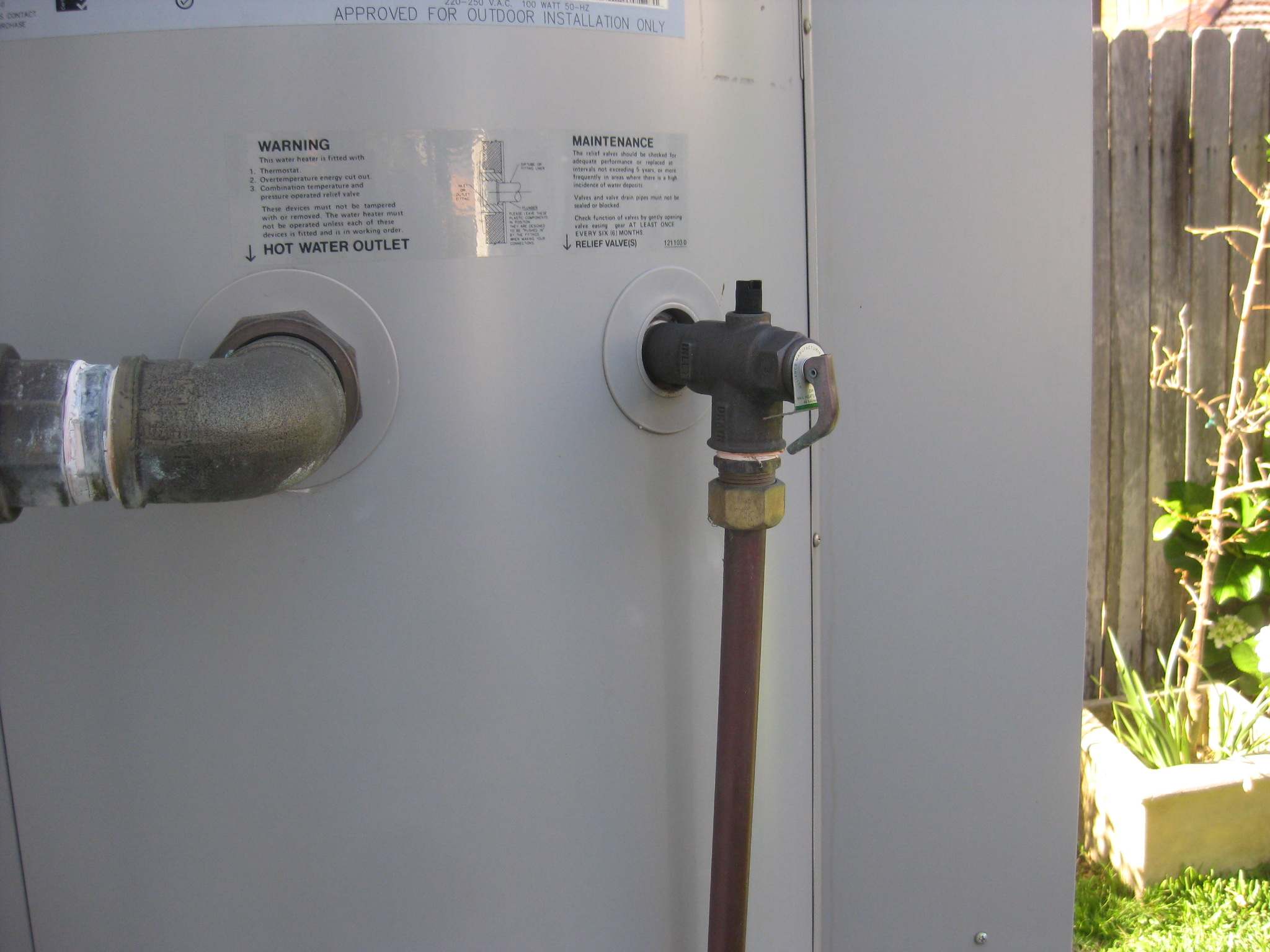
T&PR valve on mains pressure external gas water heater
See the “hook” on the Temperature and Pressure Relief valve, lift it and hold it up for 30 seconds at least every three months. If this is working properly, it will discharge the hot water whilst you hold up the hook, then stop when you let it go. It is normal for it to discharge water while the heater is heating. Then the water should stop! Be careful the hot water doesn’t scald you.
Our water heater is a friend, if you are ever unsure about how your water heater is performing, or have any questions about any of the things we have outlined here, contact a professional plumber for guidance.
Remember to engage a licensed plumber to attend to your hot water heater.
https://www.thelonedrainerandpronto.com.au/hot-water-services.html
Toilet Paper or Bidet?
The Harsh Reality of Using Toilet Paper Rather Than Washing with a Bidet
Having travelled Europe extensively, one gets used to a bidet. Coming back to Australia made some of the queried group bemoan the loss of the bidets they got so used to. The question as to whether or not it was environmentally responsible to throw tissue paper in the toilet or in the trash was raised.
The questioner remarked that they were bothered by how much tissue paper is used by a single family and they wondered just what it takes to remove the paper from sewage lines and from the treatment plants. Some experts were asked this question and they came up with answers to those questions and wonderings. Of course, all the experts came from the plumbing services fields and would know best how to deal with this problem; they gave opinions on what they felt were the best options. We also inquired at several plumbing services and a couple of places that offered a professional plumber.
When attached to a sewer line that is maintained and repaired by a city, the toilet paper is decomposed through the processing system. In order to break down any solid matter that is in the waste water, methane is used. Ways to harness this methane gas is being researched and tested to make this process more efficient. Toilet paper blockages in the sewer lines don’t happen often, but consider the fact that the blockages would be reduced if a bidet were used.
Cleaning one’s self with toilet paper in a home that is hooked to a septic tank can cause all sorts of nasty things to happen inside your house when blockages happen. Plumbing services have to be called in to remove the offending paper, and then any crack in the pipe or seam that is a little rough can gather another huge wad of toilet paper and clog everything up again. This is good news for the plumber; they appreciate the business, but for the home owner, this is a costly repair.
Bidets would do away with the need for toilet paper and end the numerous blockages that are created when someone shoves a huge wad of paper down the toilet.
If you are really lamenting the loss of the bidet, call in the plumbing services and get your bidet installed. Almost any plumber will be more than happy to install a bidet for your home. With a bidet of your own, you will reduce the amount of paper that is used, reducing the amount of trees used in the process.
Giving up the toilet paper is much more sanitary than giving up the bidet. The bidet allows for a cleaner person while not using as many resources.
In the end it was decided that the bidet is the best way to go environmentally, for the best sanitation and for low repair bills.

